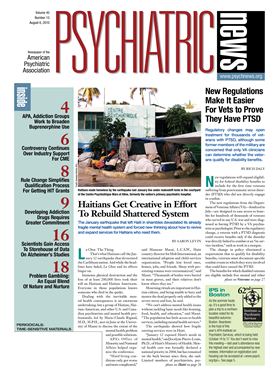Some 4,000 individuals living on the Mediterranean island of Sardinia have a special claim to fame in the world of psychiatric genetics.
They are a genetically homogenous population and thus ideal for gene hunts. They also agreed to participate in what appears to be the first genomewide association study to identify genes undergirding the major personality traits of neuroticism, extraversion, openness, agreeableness, and conscientiousness identified by the Revised NEO Personality Inventory, and they were willing to provide blood samples for DNA analysis.
The researchers were headed by Antonio Terracciano, Ph.D., a staff scientist at the U.S. National Institute on Aging. They looked to see whether they could find genomewide significant associations between some of the snips of genetic material taken from subjects' DNA and the personality dimensions of interest. Unfortunately they could not, they reported in the June Molecular Psychiatry. Nonetheless, they did identify a handful of snips that might contribute to these traits.
For example, a snip from chromosome 20 called SNAP25 was linked with neuroticism. SNAP25 had already been linked with mood disorders, attention-deficit/hyperactivity disorder, and schizophrenia.
A snip located close to the gene that codes for brain-derived neurotrophic factor was associated with extraversion. This was the most surprising finding, Terracciano told Psychiatric News, because they had expected it to be linked with neuroticism, not extraversion, as some previous studies had found. Nonetheless, “the finding has been corroborated in other samples,” he said.
The strongest link was found between a snip called rs644148 and the personality trait of openness. This snip was linked to extraversion as well. This snip is not from any known gene, and its function is unknown.
Several snips of genetic material located within or close to the CLOCK gene were linked with the personality trait of agreeableness. This was perhaps the most interesting finding, Terracciano and his group indicated, because the CLOCK gene is known to influence circadian rhythms and has been coupled with sleep and mood disorders.
As for the personality trait of conscientiousness, it was associated with snips located within a gene on chromosome 21 called the DYRK1A gene. This gene is also known to be overly expressed in the brains of subjects with Down syndrome and to influence beta-amyloid production in the brains of patients with Alzheimer's. However, the reason why a conscientiousness-related gene might play a role in Down syndrome or Alzheimer's is far from clear, the researchers acknowledged.
“Our findings and those of other genome-wide association studies are unlikely to have immediately translational impact,” Terracciano told Psychiatric News, “but they suggest a role of specific and often novel genetic variants in complex traits and diseases. These common genetic variants are [also] useful in pointing to biological pathways or genes that might harbor rarer variants with larger effects in a few families. It is also conceivable that they could be points of intervention by modifications in environmental factors or eventually in pharmaceutical products; but this is a distant prospect.”
The study was funded by the National Institutes of Health and NARSAD.

